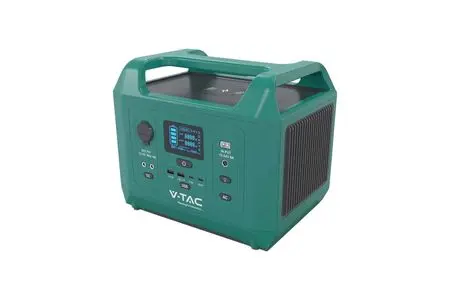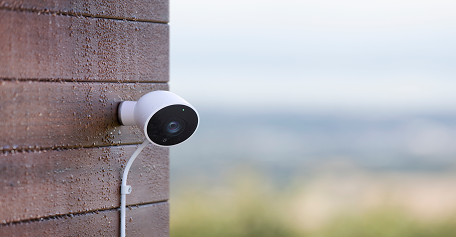 Free delivery on orders over £75 ex VAT
Free delivery on orders over £75 ex VAT Free click & collect from branches nationwide
Free click & collect from branches nationwideIf you’re looking for a reliable and convenient power source for your outdoor activities or emergency situations, a portable power station could be the perfect solution.
Portable power stations are an excellent choice for homeowners who require a reliable, portable, and eco-friendly power source. With their versatility, quiet operation, and ease of use, making the switch to a portable power station allows you to enjoy reliable power wherever you go.
At City Plumbing, our new and improved Elecstore offers over a staggering 12,000 electrical products to shop from. With everything that you need to power up and stay connected, here we consider the benefits of choosing portable power stations over traditional generators and why they’re becoming increasingly popular among homeowners.
What Are Portable Power Stations?
A portable power station is a versatile, self-contained unit that provides electricity using a rechargeable battery. Unlike traditional gas generators that use a combustion engine, portable power stations operate silently, without fumes or emissions, making them safe for both indoor and outdoor use.
These devices are essentially powerful battery banks equipped with various output ports, including standard AC (wall) outlets, USB ports (Type-A and Type-C), and DC ports (like a car outlet). This variety of ports allows them to power or charge a wide range of electronics and small appliances, from smartphones and laptops to mini-fridges, power tools, and even medical devices like CPAP machines.
They are designed for situations where access to a traditional power outlet is limited or unavailable, such as during a power outage, while camping, or on a road trip.
Buy V-Tac Portable Power Stations At City Plumbing
City Plumbing sells the renowned brand, V-Tac, offering a selection of their portable power stations. These products, like the V-Tac 600W, are excellent solutions for homeowners who want to ensure they're never left in the dark.
In an increasingly connected world, having a reliable power source that isn't dependent on the grid is becoming a necessity, not just a luxury.

Why Consider a V-Tac Portable Power Station?
Peace of Mind During Power Outages
Power cuts, whether caused by severe weather, network issues, or other emergencies, can be incredibly disruptive. A portable power station is your essential backup plan.
- Keep Essentials Running: Power crucial devices like your modem and router to stay connected to the internet, charge your mobile phone, or run lights to avoid fumbling in the dark.
- Safety and Security: A portable power station can power a home security system, ensuring your family and property remain safe, or run medical equipment that requires a continuous power supply.

A Green and Quiet Alternative to Generators
Unlike traditional fuel-powered generators, V-Tac portable power stations are:
- Eco-Friendly: They operate on rechargeable batteries and can be recharged using solar panel, making them a cleaner, greener energy solution. They don't produce harmful fumes, making them safe for indoor use.
- Quiet Operation: They run silently, which is a major advantage over the loud, disruptive noise of a petrol generator. This is ideal for use at night or in quiet residential areas.

Versatility for Home and Leisure
A portable power station isn't just for emergencies but rather a versatile tool for everyday life.
- Outdoor Activities: Take it with you for camping, caravanning, or even a picnic in the park to power up outdoor lights, a mini-fridge, or a speaker.
- DIY Projects: Use it to power tools in areas of your home or garden where an electrical outlet isn't easily accessible.
- Flexible Working: If you work from home and need a reliable power source for your laptop and other devices, a portable power station gives you the freedom to work anywhere in the house or even in the garden.

Key Features of V-Tac Portable Power Stations
- Multiple Power Outputs: V-Tac models come with a variety of ports, including standard UK AC sockets, USB-A, and USB-C ports, allowing you to charge and power multiple devices at once. Some even have a wireless charging pad.
- LiFePO4 Battery: V-Tac stations use a high-quality, long-lasting LiFePO4 (Lithium Iron Phosphate) battery, which offers a longer cycle life (e.g. 2,000 cycles) compared to other battery types.
- Advanced Safety Features: Built-in safety measures protect against over-current, over-voltage, over-temperature, and short-circuits, ensuring the safety of both the unit and your connected devices.
- Compact and Portable Design: The units are designed to be lightweight and compact, with easy-to-carry handles, making them highly portable.

Portable Power Station Frequently Asked Questions
How Is a Portable Power Station Different from a Power Bank or a Gas Generator?
- Power Bank: A power bank is a small, portable battery designed for charging small electronics like phones and tablets, typically only having USB outlets. A portable power station has a much larger capacity and includes AC outlets to power bigger devices.
- Gas Generator: A gas generator creates electricity by burning fuel. It is loud, produces harmful emissions, and is not safe for indoor use. A portable power station stores electricity in a rechargeable battery, operating quietly and cleanly.
What Do the Terms “Watt-Hours (Wh)” and “Watts (W)” Mean?
- Watt-hours (Wh): This is the unit for a power station's battery capacity, indicating how much energy it can store. A higher Wh rating means it can run devices for a longer time. For example, a 500Wh power station can theoretically power a 50W device for 10 hours (500 Wh/50 W=10 hours).
- Watts (W): This is the unit for a power station's power output, which is the amount of power it can deliver at one time. A higher W rating means it can power more demanding appliances. You need to ensure the power station's wattage can handle the combined wattage of the devices you plan to use simultaneously.
How Do I Charge a Portable Power Station?
Most portable power stations offer multiple charging methods:
- AC Wall Outlet: This is typically the fastest way to charge the unit.
- Solar Panels: Many models are compatible with portable solar panels, allowing you to recharge using sunlight, which is ideal for off-grid situations.
- Car Charger: You can also charge the unit from your vehicle's 12V DC outlet.
Can I Use a Portable Power Station While It’s Charging?
Yes, many modern portable power stations support "pass-through charging," which allows you to use the power station to power devices while it is simultaneously being charged.
Can a Portable Power Station Power My Entire House?
No. Most portable power stations are not designed to power an entire home. They are best suited for running essential appliances and electronics during a power outage or for providing power for specific off-grid activities. For whole-home backup, a larger-scale home battery system or a traditional generator is a better choice.
Are Portable Power Stations Safe to Use Indoors?
Yes. Since they are battery-powered and do not produce carbon monoxide or other harmful emissions, they are safe to use indoors in a tent, shed, caravan, or campervan.
How Long Do Portable Power Stations Last?
The lifespan of a portable power station is measured in charge cycles. The battery type (e.g. lithium-ion or LiFePO) and proper care significantly impact its longevity. Many modern power stations use LiFePO batteries, which are known for their long lifespan, often rated for thousands of charge cycles and over 10 years of use with proper maintenance.
Go Portable & Stay Connected At All Times
Ultimately, a V-Tac portable power station is a smart investment for many homeowners. It's a clean, quiet, and reliable way to stay powered and connected, whether you're dealing with a power outage, working remotely, or enjoying leisure time outdoors.
If you’re looking for helpful advice and suggestions on choosing the best products for your home, take a further look at our City Plumbing website for more information.

